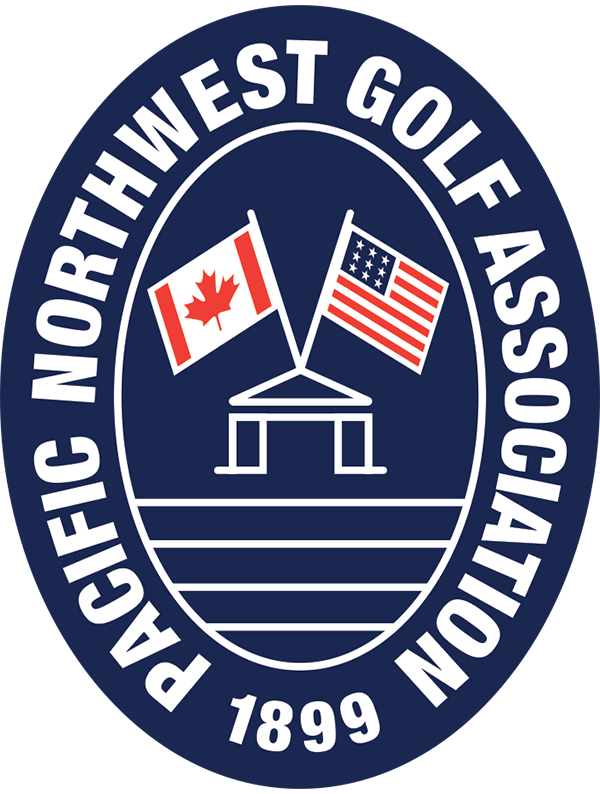Northwest Influential: The Coaches
by Tony Dear
Of all the articles in this series, this was probably the toughest in which to limit the candidates to just a few individuals. Fifty to a hundred years of history from a dozen or more college golf programs throughout our region threw up a number of solid candidates, and choosing between them wasn’t easy.
It was tough to leave out the likes of Lauris Talmey who coached the brilliant Gayle Hitchens at the University of British Columbia during the 1960s; the University of Washington’s OD Vincent who was elected to the Golf Coaches Association of America Hall of Fame in 2014; Jon Reehoorn who spent three years as assistant coach at UW and three years at the University of Idaho before moving to Oregon State in 2010; Brad Rickel who has spent the last 20 years bringing out the best of Idaho and Gonzaga’s women golfers; and Idaho’s Lisa Johnson who has been on staff for five of the team’s six NCAA Regional appearances, including four as head coach.
But the coaches listed below are truly special, however, and anyone who spent four years under their watch should consider themselves extremely fortunate.
Golf in the Pacific Northwest has a rich history, full of characters, frontrunners, visionaries, boom-and-bust epics, and too-good-to-be-true (but mostly they really are true) tales.
This is the fifth in a series of articles, highlighting the people who have made this far corner of the continent our center of the golf universe, and have shaped the way we play the game.
We’ve been touching on just a handful of people, in no particular order, in six categories over several issues of this magazine – the Visionaries, Storytellers, Teachers, Architects, Coaches and Players.
Lists are dangerous things. They are inevitably incomplete, subjective, and all-too-short. So here we go……

John Buchanan
Simon Fraser University men’s/women’s teams, 1988-2017
It would be difficult to over-estimate the impact John Buchanan had on athletics – soccer and golf, specifically – at Simon Fraser University in B.C. A member of the school’s staff for 50 years, Buchanan created the soccer program and took the Clan to the National Association of Intercollegiate Athletics (NAIA) national title in 1976.
Buchanan took over the golf program, both men’s and women’s teams in 1988, 16 years after the programs had been created. The team, not terribly successful to that point, became a force in NAIA golf, qualifying for Regionals and Nationals on a regular basis. The team finished second at Nationals in 1999 with Brent Osachoff finishing as medalist. Sixteen years later, and at the age of 75, Buchanan led his team to an incredible fifth place finish at the NCAA D-II National Championship.
“John Buchanan is an SFU legend,” says Matthew Steinbach, the current coach of both the men’s and women’s teams. “He almost singlehandedly raised the profile of the golf program at SFU, making it nationally-recognized.” Buchanan, who is a charter member of the SFU Athletics Hall of Fame, passed away in January 2017 at the age of 77, while still coach of SFU’s golf teams. After his death, his family established The John Buchanan Endowment for Golf at SFU.
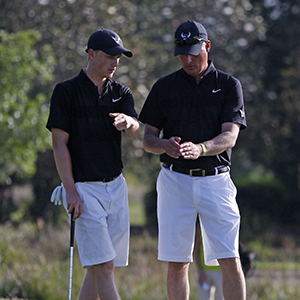
Steve Card
Western Washington University men’s team, 1993-2013
The highlight of Steve Card’s 20-year career as men’s golf coach at Western Washington University came in his very last event – the 2013 NCAA D-II National Championship where the Vikings made it all the way to the semifinals, a school-best performance.
Card, a 1987 graduate of Washington State University where he played all four years for the Cougars, becoming team captain in his final year, coached 27 All-Americans during his time as Western golf coach and was named National Chair for NCAA D-II Men’s Golf in 2011. Two years previously, he had played an instrumental role in having the school selected to host the National Championship at Loomis Trail GC in Blaine, Wash.
Card led the Vikings to 12 national appearances including six straight from 1995 to 2000, and was named league coach of the year 10 times, Great Northwest Athletic Conference (GNAC) Coach of the Year six times, and D-II West Region’s top coach four times.
Another of his team’s great accomplishments was winning the NCAA West Regional in 2005. “We had a seven-under-par round in the South Dakota snow on a day when only three teams broke 300,” he remembers.
Card coached many fine players during his time in Bellingham, including Tim Feenstra, now a PGA professional at Broadmoor GC in Seattle; Jake Koppenberg, who has qualified for four U.S. Amateurs and now serves as an assistant golf coach at Western; former Washington Open winner Josh Immordino; and cross-handed player Craig Welty, the PGA head professional at Skagit Golf & Country Club in Burlington.
“Coach Card taught me loyalty, integrity, etiquette, and how to live life,” says Welty. “He helped me improve my game each year I was at WWU. I would not have the highlights in golf that I experienced if it weren’t for Steve Card believing in me.”
Card has been Western’s Director of Athletics since March 2014.
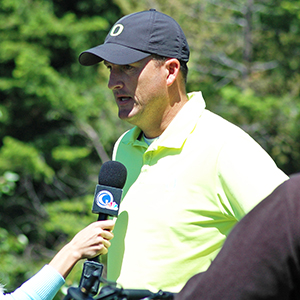
Casey Martin
University of Oregon men’s team, 2006-present
Golfers who don’t pay much attention to the college game may well be able to tell you Casey Martin was a teammate of Tiger Woods at Stanford, that he played on the PGA Tour around the turn of the century (making 19 cuts from 43 events), and that he was the guy the Supreme Court allowed to ride a cart on tour because of his battle with congenital circulatory disorder Klippel-Trenaunay-Weber syndrome, but they probably won’t know where’s he’s been since those days.
The 47-year-old, Eugene, Ore.-native has actually been forging the most accomplished coaching record in the history of University of Oregon golf, being named the Golfweek National Coach of the Year in 2017, twice winning the Pac-12 Coach of the Year award, producing 13 All-Americans since he took over from Steve Nosler in 2006, and guiding his team to 33 tournament wins including the 2016 NCAA National Championship on Oregon’s home turf at Eugene CC.
Martin naturally cites that moment as the most memorable of his career so far. “Watching Sulman Raza make the winning putt at the 2016 National Championship was just amazing,” he says. “It was overwhelming.”
Oregon’s on-course leader that week and winner of the individual medal was Aaron Wise, one of a handful of truly great college players Martin has developed. Besides Wise, a PGA Tour winner already, Martin has been able to work with Wyndham Clark, Norman Xiong, Daniel Miernicki, and Eugene Wong, all of whom have benefitted from Coach Martin’s playing experience, passion for his job, and what he calls “good emotional awareness for what my team needs.”
Given the perseverance, tenacity, and determination he has demonstrated throughout his playing and coaching days, how could you not want to play for a coach like Casey Martin?
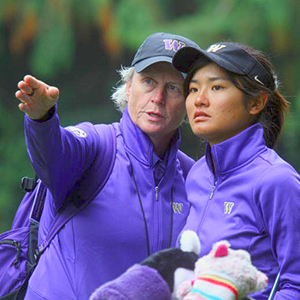
Mary Lou Mulflur
University of Washington women’s team, 1983-present
Besides Paige Mackenzie who played seven full seasons on the LPGA Tour, Mary Lou Mulflur names Kelli Kamimura as probably the best golfer who has played for her during a remarkable 37-year career. And yes, the feeling of admiration is entirely mutual.
“There are so many things I admire about Mary Lou,” says Kamimura, now the women’s coach at Washington State. “She is an incredible coach and person, and I’ve been lucky to have had her as a coach, a colleague, and a lifelong mentor and friend.”
One of the things Kamimura noticed most while at the UW was how passionate about her players Mulflur was. “She really wanted you to reach your full potential,” she says. “And she’s still a big part of my life today. She’s my biggest cheerleader, but isn’t afraid to give me advice. I can’t really express my gratitude for how much she has helped shape my life.”
Mulflur is the sort of coach that has a profound effect on her players without really knowing how or why. She is just a natural-born coach and unable to specify exactly what makes her, or anybody else, good at it.
“I have no idea,” she says before throwing out a few characteristics she believes are essential, and which she possesses in spades. “Patience, persistence and being relentless in your effort,” she says. “Understanding that it is not a perfect science, and that the job of Coach is fluid. I also think it’s important to absolutely love what you do. I’m so fortunate to coach my alma mater, and am excited to go to work every day.”
There was no more exciting day for Mulflur than May 25th, 2016 of course. On a never-to-be-forgotten, late spring afternoon at Eugene Country Club, Mulflur watched as her team defeated Stanford to win the first national championship in the program’s history. She certainly showed some emotion that day, but Mulflur says she was actually pretty relaxed. “The last couple of hours were very calm for me,” she remembers. “In fact, I’ve described that week as the calmest of my entire coaching career.”
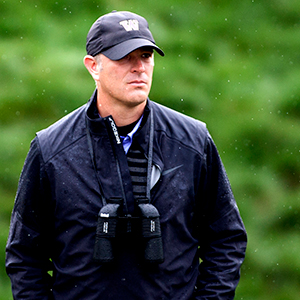
Matt Thurmond
University of Washington men’s team, 2000-2016
After graduating from Brigham Young University in 1999 with a degree in English, Bellingham-born Thurmond remained in Provo, Utah for a year, serving as assistant golf coach before moving to the University of Washington in 2000.
He began his time in Seattle as assistant to OD Vincent before taking over the head coach’s duties from the UW legend a year later. Thurmond gives Vincent a great deal of credit for leaving him a program that was “ready to take off,” but it didn’t take long for him to start registering his own successes.
One of the most memorable early years was 2005 when UW staged a 17-shot comeback in the final round to win the Pac-10 Championship, and then finished third at the NCAA National Championship where James Lepp won individual honors. Four years later, the team won the Pac-10 convincingly at Seattle Golf Club in front of an enthusiastic home crowd.
Thurmond coached many fine players at UW, and struggled to name his top five but eventually chose CT Pan, Chris Williams, Nick Taylor, Brock Mackenzie, and Lepp. “How about that for a starting five?” he asks. “There were several more really good players – Alex Prugh, Richard Lee, Corey Pereira, the list goes on, but those first five were First Team All-Americans and some of the best amateur golfers in the world.”
In 2016, Thurmond left Seattle for Arizona State University where he is building a similarly strong program.
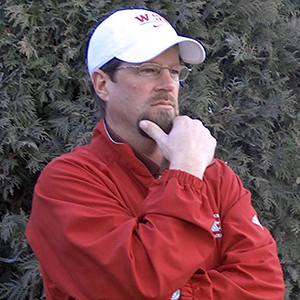
Walt Williams
Washington State University men’s/women’s teams, 1998-2011
The former Washington State coach is creating quite a legacy as he continues to build a quietly impressive record with at least 17 of his former players now coaching golf themselves.
Williams has long made a priority of building relationships with players, saying he loves to help them reach their goals. “I keep in touch with as many as possible and try to help them progress into their next step along life’s journey,” he adds.
After working as a club professional in his native Texas, Williams began his coaching career at Sam Houston University in 1992. Six years later he moved to Pullman where he coached both the men’s and women’s teams and led the men’s team to a dozen NCAA Regionals appearances and one appearance in the NCAA National Championships. Twenty-four of his players earned All Pac-12 honors and four became All-Americans.
Williams says qualifying the women’s team for the National Championship in 2003, qualifying the men’s team for the West Regional in 2002, and being named Pac-10 Coach of the Year in 2002, are his three most memorable moments from his time at Washington State, adding that the best players he coached were Kim Welch, Dustin White, Kevin Tucker, Ana Kostina, Amy Eneroth and Jon Reehoorn.
Since moving from Pullman back to Texas in 2011, Williams has continued to elevate the status of numerous programs, first at Western Texas CC, then Louisiana-Monroe, LeTourneau, and now Midland CC where he has won two conference championships, two regional championships, and had two third-place finishes in the National Junior College Athletic Association (NJCAA) National Championship. He’s also received two conference, two regional, and one national Coach of the Year awards.
Williams’s recipe for coaching success, “Forming a loving and encouraging atmosphere for your players, plus a competitive environment where day-to-day work is fun,” is clearly still working after 27 years.
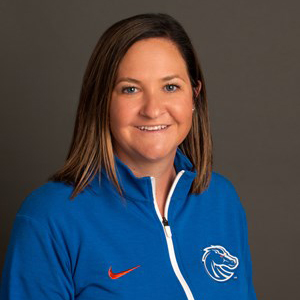
Nicole Bird
Boise State University women’s team, 2007-present
Nicole is the longest-tenured head coach at Boise State since the women’s program’s inaugural season in 1992-93. Since she took over in 2007, Bird has steadily orchestrated a turnaround that has included team titles, individual titles and multiple achievements from student-athletes – both on and off the course.
Six of the top eight team season scoring averages have come from Bird-coached teams, including the 2016-17 team that ended up with a 310.28 average – good for No. 7 in program history.
Eight of the top 10 career scoring averages along with eight of the top 10 single-season scoring averages in school history have all come under Bird’s tutelage. Bird’s five victories as head coach are the most in school history.
The success in the classroom has also continued with a 3.58 2016 fall semester GPA and a 3.61 cumulative GPA – the fourth-highest cumulative GPA in program history. Five of the seven Broncos on the team were also named 2016-17 All-American Scholars by the Women’s Golf Coaches Association, as well.
The team set the then-school record for highest single-semester grade-point average with a 3.68 in the spring of 2012, beginning a streak of three-consecutive semesters with the highest GPA in the department. The Broncos recorded another perfect multi-year APR of 1,000 in 2015-16 as well.
Bird joined Boise State after spending five seasons as an assistant coach at TCU. She has served as the assistant tournament director for the 2004 Conference-USA Women’s Golf Championships, as an intern with the American Junior Golf Association and as the AJGA’s Manager of Tournament Administration.
(Editor’s note: this article first appeared in the August 2019 issue of Pacific Northwest Golfer magazine, and the section about Nicole Bird was added by the editor for posting on this site.)
Tony Dear is an award-winning golf writer who has authored several books on golf, including the recent The Story of Golf in Fifty Holes.
